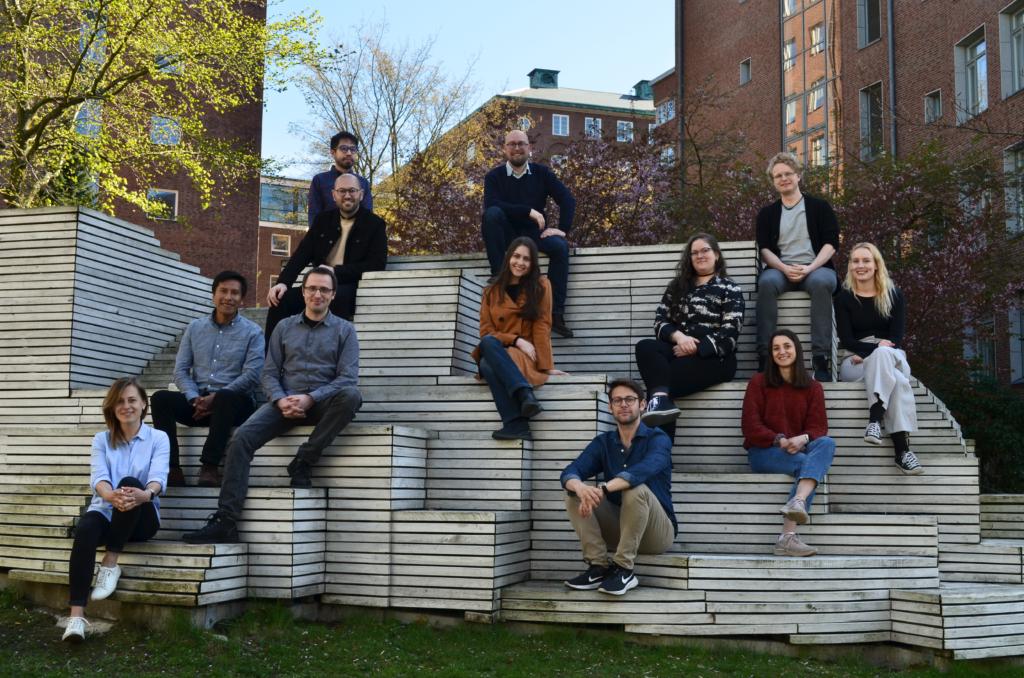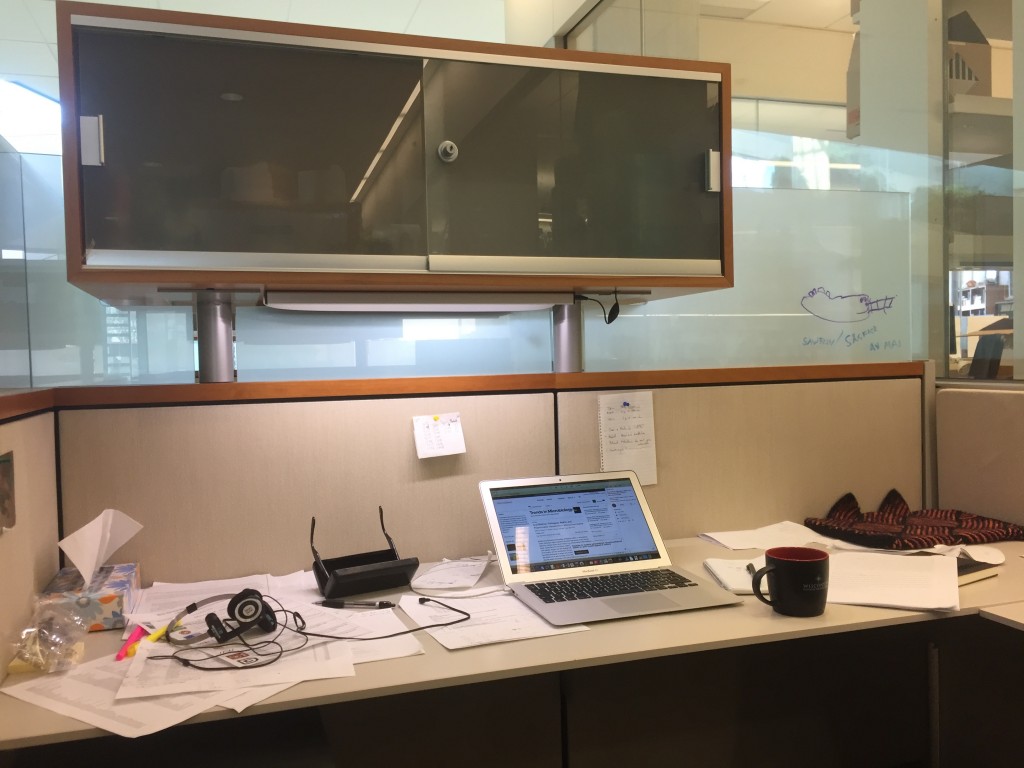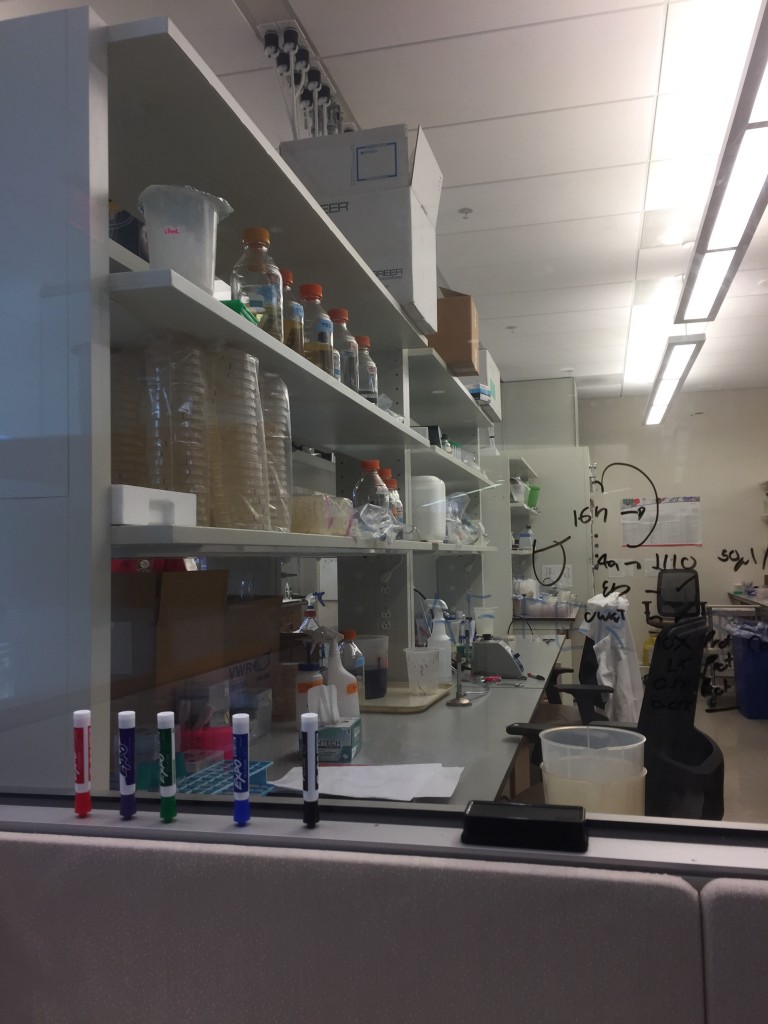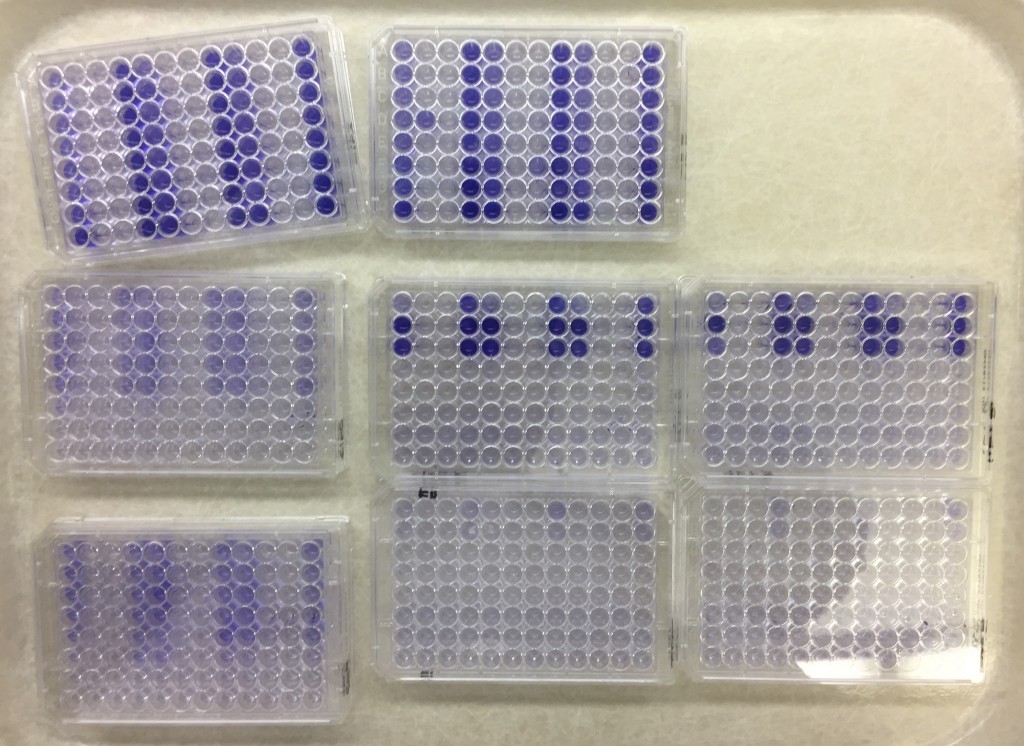New team members
Time is passing quickly, and I have not appropriately acknowledged the many newcomers we’ve had to the lab in the past couple of months. With this post I would like to say welcome to the lab to Máté Vass and Dani Jáen Luchoro (both postdocs), Jorge Agramont and Josue Mamani Jarro (doctoral students), as well as Nathália Abichabki (visiting doctoral student from Brazil)! Some of you have already spent a couple of months in the group and we very much enjoy having you here!

A week or so ago, we took this new lab picture with everyone (except for Lisa, who is in Amsterdam). I am very proud to be working with group of extremely talented, smart, funny and goodhearted people!
Very briefly, Dani will be working on updating the BacMet database as part of the BIOCIDE project, and shares his time between my group, Joakim Larsson‘s group and the Sahlgrenska hospital. Máté was recruited within the DDLS program and will work on inferring the metacommunity ecology of antibiotic resistance based on analysis of large-scale datasets. Jorge and Josue are part of the same SIDA-funded doctoral student exchange program with Bolivia and will work on different aspects of environmental antibiotic resistance and the spread of diarrheal pathogens through the environmental matrix. Nathália, finally, is working on understanding the tolerance mechanisms to antibiotics in Klebsiella pneumoniae.
All of you are very welcome to the group!
Open PhD position
We are hiring a PhD student to work with interactions between the bacteria in human and environmental microbiomes that are important for community stability and resilience to being colonized by unwanted bacteria (including pathogens). The project seeks to unearth which environmental and genetic factors that are important determinants of bacterial invasiveness and community stability. You can read more at our Open Positions page.
We are looking for a candidate with experience with both bioinformatics and experimental microbiology. Previous experience with microbial communities is a plus, but not a must, as is work with human cell lines.
The project is fully funded by a grant from the Swedish Research Council and the position is planned for 4.5 years, with 4 years of research and course work and half a year of teaching.
If you feel that you are the right person for this position, you can apply here. We look forward to your application! The deadline for applications is October 21.
Two fun things
Fun things on a Friday! First of all, we have updated our lab member page with some beautiful photos! Thanks Marcus for brining your camera today!
Second, our review of factors important for antibiotic resistance development in the environment has been recognised by FEMS Microbiology Reviews as one of the papers which have made the most impact across their portfolio. It has been added to a new (well, this is old news, so semi-new) collection of papers – ‘Articles with Impact’ – many of which are very well worth a read!
Have a nice weekend!
Welcome Mahbuba, Sebastian and Marcus
The fall is here and with it comes the arrival of three new group members. This fall, we are joined by Mahbuba Lubna, Sebastian Wettersten and Marcus Wenne. All three are master students from the University of Gothenburg and they will work on very different things.
Mahbuba will work together with Emil Burman on genes responsible for invasion in microbial communities (primarily THOR), expanding on Emil’s work and testing new and existing candidate genes in a wider diversity of conditions.
Sebastian will work on improving Metaxa2, making its classifications better and also enabling even better automation of database creation. Hopefully this will increase the pace of the Metaxa2 development, which has been stagnating a bit over the last two years.
Marcus, finally, will work together with Anna Abramova on analysing antibiotic resistance in a huge metagenomic dataset previously generated in the lab.
This means that we are now seven people in the lab (so if it weren’t for the covid-associated work from home recommendations, it would start to get crowded…) We welcome our three new members and look forward to an exciting fall!
The Microbiology Lab Pod
As the regularly returning reader might already have seen, the lab has started podcasting! Two weeks ago, we started recording our journal clubs (on Zoom) along with some other science-related chatter. This is mostly an experiment this far, so we will see where it goes, but it was a fun an interesting experience, and I look forward to recording the next episode in May!
The experiment is called the “Microbiology Lab Pod” and can be heard on this website, on Apple podcasts, Google podcasts, Stitcher etc.
And like that, the world had changed
I guess it hasn’t passed anyone by that we are under a global lockdown (although to very different degrees – Sweden, where we’re based, has a pretty relaxed attitude to quarantining people (1), so it could be worse for us, I guess). In any case, the novel coronavirus has forced the lab to largely work from home and has upended essentially all my plans for this spring, expect for writing grant applications (which I have done a lot).
First of all, I want to thank my fellow lab members for holding out strongly in these trying times. They have consistently shown that they are the best co-workers I could ask for, and have kept calm even when anxiety hits. Thanks a lot for that. I also would like to thank the university for providing rather clear guidance on how to handle different issues that come up in these time of crisis.
With that said, I am also sad to say that there will not be a Microbiome & Probiotics Collaboration Forum in Rotterdam on May 18-20. Instead that meeting has been postponed to early December. Similarly, I will not be in Helsinki next week to talk about EMBARK. That workshop will instead, hopefully, take place on August 28. And the same story goes for the NordicMappingAMR organised by the Swedish Medical Products Agency, which will take place at a later date (I am not sure exactly when this is planned yet).
These are trying times for all of us. I hope that you stay healthy and take care of your loved ones – particularly the elderly, but not unnecessarily visiting them. My grandparents (aged 93 and 95) have started FaceTiming us, so I guess some good things come out of this mess as well. We will come out of this crisis stronger, eventually.
Footnotes
- There are many things I could say about the Swedish strategy regarding covid-19, but this is not really the forum. In very brief, though, I have quite some faith in that the Swedish Public Health Agency is doing a decent job. Mistakes have been made (particularly early in the pandemic) and I am slightly anxious whether the Swedish strategy will play out as well as in other countries in Northern Europe, but right now data suggest that we are doing reasonable fine. I might return to this issue in another post if time permits.
Open postdoc position
We are hiring a postdoc to work with environmental monitoring of antimicrobial resistance. The project is part of the EMBARK program and will consider different aspects of establishing a baseline for background antibiotic resistance in the environment, standardization of monitoring protocols and development of methods to detect emerging resistance threats. The project will involve work with environmental sampling, DNA extractions, bacterial culturing and generation of large-scale DNA sequence data. In terms of bioinformatic analyses, the project will encompass analysis of next-generation sequence data, genome-resolved metagenomics, short-read assembly and network analysis.
We look for a skilled bioinformatician, preferably with experience of experimental laboratory work. If you feel that you are the right person for this position, you can apply here. More information is also available here. We look forward to your application! The deadline for applications is January 3.
Open PhD position
We are hiring a PhD student to work with effects of antibiotics on microbial communities! The project will use large-scale techniques to investigate how sub-inhibitory concentrations of antibiotics affect microbial communities. Specifically, the project will examine how the ability for bacteria to colonize and invade established microbial communities is impacted by antibiotics. The project will also explore how antibiotics influence the interactions between different species in bacterial communities and if this may change their ability to withstand invasions. The goal is to identify the genes and mechanisms that contribute to change and stability in microbial communities.
A cool thing about this position is that it is fairly adaptable to the eventual candidate, and the project can be somewhat tailored to suit the profile of the PhD student. This means that we’re looking for someone who is either a bioinformatician or an experimentalist (or both). Previous experience with microbial communities is a plus, but not a must.
If you feel that you are the right person for this position, you can apply here. More information is also available here. We look forward to your application! The deadline for applications is December 9.
Goodbye Adriana and Welcome Emil
The shift to October marked the last days that our visiting doctoral student Adriana Osińska spent in the lab. Adriana was working on the sequencing data generated from the invasion experiments I performed in Jo Handelsman’s lab. She managed to dig out a great number of genes that seems to have an influence on bacterial community invasion success. Those genes are now candidate genes that will be tested in follow-up studies, which brings us to….
That I forgot to introduce our newest lab member – Emil Burman! Emil is a master student performing his thesis project in the lab and will stay with us until May 2020. Emil will work on experimentally characterizing the candidate genes that Adriana has identified. We are excited to have Emil in the lab and think that he has been off to a great start already. Welcome Emil!
Adriana will no go back to Poland to complete here PhD thesis early next year. We have loved to have her in the lab and she has contributed with data and analyses of tremendous value. We wish her all the best of luck with defending her thesis!
And the experiments have started!
It’s been a long time before I have written something here, mostly because making ourselves at home in Madison have take some time; then we go the flue; and then there have been a lot at work after that. But now i will try to have another go at writing somethings on the Wisconsin Blog. First, a look at my (already messy) desk here at the Wisconsin Institute for Discovery.
And then, a look at my lab space, which I have a view of straight from my desk, through a glass window.
This week, I have started experiments with exposing our little model community to antibiotics and it looks like I’m getting potentially exciting results. I have to sit down with the data today to see if there’s statistical differences, but from the looks of the biofilms, there is potential here.
Next week I will try to start experiment with sand columns and see if I can replicate some of this in this setting as well. It is interesting being back in the lab, and I feel that this an experience that will be very valuable for me going forward. I look forward to the days later this spring when I will start generating sequence data from my own experiments!


